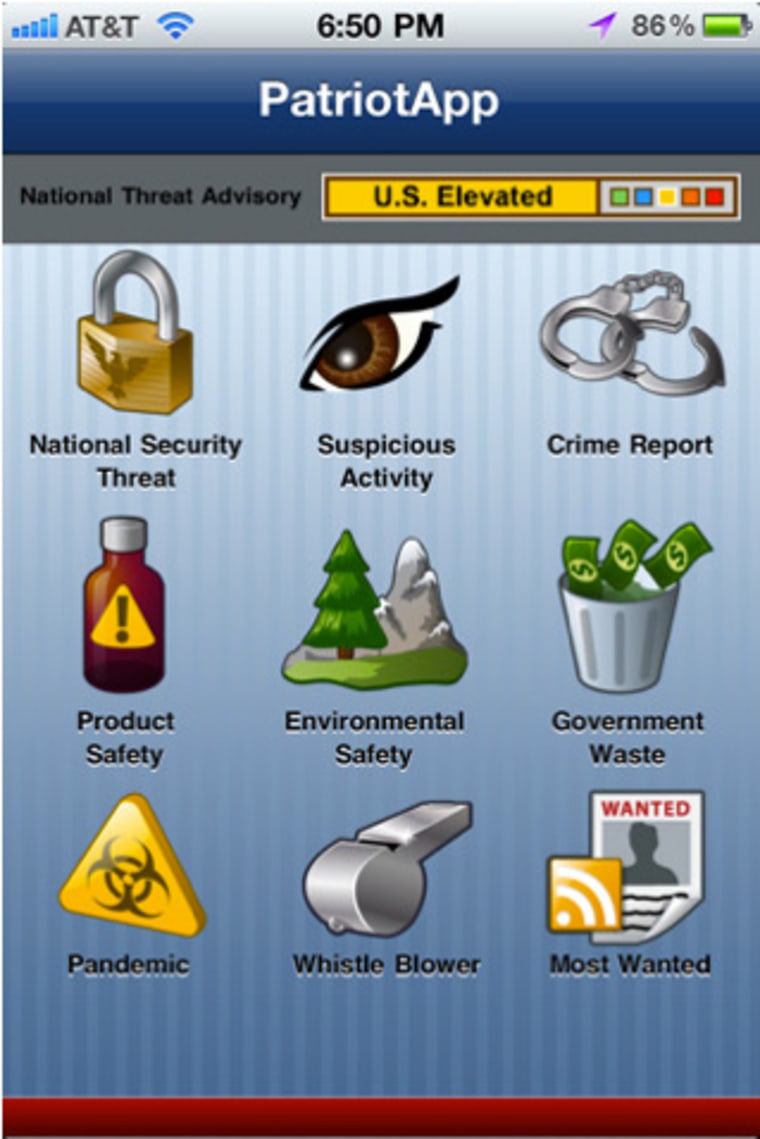A safe and secure society is at the heart of the new PatriotApp for iPhones, and while it's quickly gaining popularity, it's also attracting scorn from people who disagree with the controversial law on which it is based.
Launched in September, the PatriotApp allows people to report criminal or suspicious activity to several federal agencies, including the FBI, EPA, CDC and GAO (Government Accountability Office), the office responsible for investigating public funds. It also includes RSS feeds for the FBI's Most Wanted list and the Department of Homeland Security's threat level, and allows people to report workplace harassment and discrimination.
The app doesn't grant a user privileged access to these agencies; rather, it bundles each group's Internet tip line (ITL) — the website feature used to report incidents — and makes them mobile-phone friendly, and even enables users to send pictures. While it offers users a direct portal to each site's ITL, the user must still go through the same process — and obey the same policies and warnings — as they would if accessing the site on a computer.
Playing off the Patriot Act name, "the app was founded on the belief that citizens can provide the most sophisticated and broad network of eyes and ears necessary to prevent terrorism, crime, environmental negligence, or other malicious behavior," according to Patriotapps.com.
Before delving into a discussion about the PatriotApp, Dr. Roy Swiger, one of the app's co-creators, acknowledged the inherent controversy in an app that models its mission on the Patriot Act.
"Some bloggers don't think this is a good idea, they're likening it to Nazi Germany," Swiger told SecurityNewsDaily. "But a lot of folks are very positive." Backing that point up, Swiger said since the app was made free last Friday (Dec. 10), it has been downloaded about 400 times a day.
The PatriotApp, Swiger said, isn't meant to be a "Big Brother"-type surveillance tool that lets people report anything they deem "suspicious." Rather, its aim is to use modern mobile technology to give people easier access in the event of a true crisis.
"I look at this basically as an instrument that can be used by folks to rapidly get tips online for various agencies all in one organized place," Swiger told SecurityNewsDaily. "We're not doing anything that's not already available. I look at this as the next logical step, especially in this day and age."
Before cell phones, if you were on the road and you saw a drunk driver, you would have to race to the nearest payphone and report it to the police, Swiger said. But cell phones have removed that step and now people can report such an incident as it happens. This is how he envisions people using the PatriotApp.
"That's what this is about, it's about using state-of-the-art technology and information sharing and trying to do good," Swiger said. "We wanted to show that you could use an app for something that's important, not just entertainment."
In the future, Swiger hopes the PatriotApp can be used implemented to allow people to report health epidemics in real time.
"I really think this is a game-changer," he said.
A game-changer, and potentially a fire starter, critics say. John Pike, a national security analyst and director of GlobalSecurity.org, believes the access granted by the PatriotApp could potentially bog down sites such as the FBI, impeding them from operating as effectively as they could.
"I think the FBI has already been flooded with useless tips from various public and government sources that have wasted a vast amount of their time to no avail," Pike told SecurityNewsDaily.
Pike said that NSA surveillance of domestic phone conversations is a strong deterrent to preventing and intercepting potential terrorist acts. "Previously, the challenge of discovering the telephone number for the FBI would have been a deterrent to many people. But with this app, any idiot can play Junior G-man," he said.
Swiger and co-creator Charles Reinighaus understand where the naysayers are coming from, but they stand behind the PatriotApp, and believe not only in its inherent mission, but in the responsibility of people to use it correctly.
"All we did was leverage current existing government outlets. If government was truly focused on open access, they would've done the same thing," Reinighaus told SecurityNewsDaily. "The whole intent is to benefit society and give citizens an active role in participating in their own security rather than abdicating themselves to government – to put the people back into ‘we the people.'"
Swiger supports the people," saying, "I've got confidence in the society we live in that people will use their best judgment. I don't think it will be abused."
The PatriotApp is available as a free download from the iTunes app store. For more information visit www.patriotapps.com.
